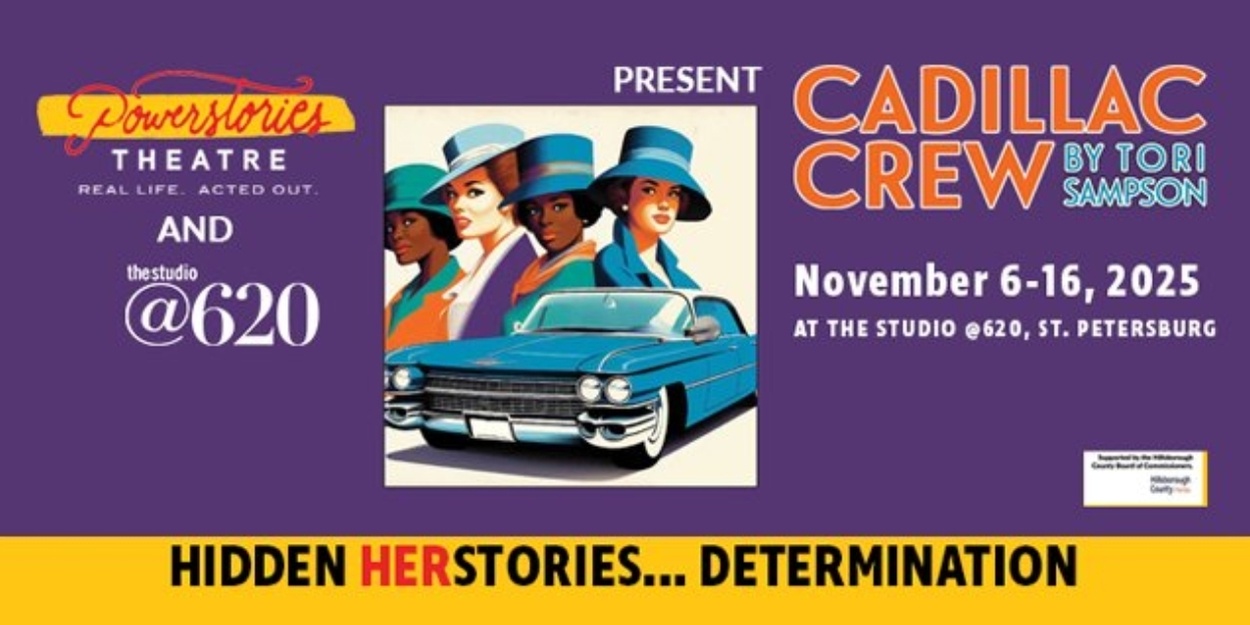In a partnership as bold as the women it honors, Powerstories Theatre and The Studio@620 join forces November 6–16 for Cadillac Crew—a powerful, sharply written play by Tori Sampson that reclaims the untold story of women who helped drive the Civil Rights Movement.
Set in Virginia on the day Rosa Parks is scheduled to speak, Cadillac Crew follows four Black women working in a civil rights office, each carrying the dual weight of progress and invisibility. As they prepare for the day’s historic event, they confront the painful truth of being overshadowed within a movement they helped build. Through Sampson’s piercing dialogue and emotional honesty, the play exposes the sacrifices and steadfast defiance of women whose vital voices and deeds were long overlooked—until now. It’s an unflinching reclamation of their place in history, ensuring their legacy finally resonates.
The title pays homage to the real “Cadillac Crews”—groups of women who drove across the country uniting communities in the fight for desegregation and voting rights. Their work was the backbone of the movement, yet their names are rarely found in textbooks.
For Powerstories Theatre, closing its 25th anniversary season with Cadillac Crew is more than a milestone—it’s a statement of purpose. The company has spent a quarter-century amplifying women’s and girls’ voices, sharing true stories that open minds and hearts. For founder Fran Powers, this production is a living extension of that mission—championing authentic voices, hard truths, and the enduring power of women’s stories. It serves as a poignant reminder that behind every movement are women who carried the weight, did the work, and paved the way for others to stand taller.
For The Studio@620, opening its 2025–26 season with the production is equally significant. Under Erica Sutherlin’s artistic direction, it marks the beginning of a season rooted in truth-telling, community engagement, and the transformative power of art. The timing feels intentional—two theaters meeting at a crossroads of celebration and recommitment to shared values, making this collaboration both natural and deeply meaningful.
Directed by Sutherlin, the cast features Ivy Sunflower as Rachel, Marjorie Joseph as Abbey, Jai Shanae as Sarah, and Andresia Moseley as Dee—four powerhouse performers whose portrayals embody resilience, humor, and hope. Together, they bring to life women whose impact shaped history, even when history forgot their names.
Moseley says, “It’s an honor to take on the role of these pioneering women who literally risked life and family to take these trips—to stand for the rights of women. In the case of my character Dee, she does it not only for the cause, but to ensure her daughter grows up in a world, as she says in the script, ‘where she legally has the right to exist.’
“To be part of these combining theatres that have chosen, especially in the state of the world now, to do this story makes me, as an actress, stand even stronger in my conviction that this work needs and should be done more often. I can use my talent to further voice where I stand—and I stand for Black narratives and that history should not be erased. Our stories need to be told, and as long as I choose the stage, they will be. I am not just doing this work. I am it.”
Cadillac Crew unfolds with urgency and reverence, bridging past and present in a way that feels both timeless and immediate. Under Sutherlin’s direction, the production becomes more than a historical retelling—it’s a reflection and a rallying cry. At its heart, Cadillac Crew honors the women who organized, marched, and sacrificed—often without recognition—for causes greater than themselves. The play urges audiences to remember those who came before, acknowledge those still fighting, and recognize how the stories we tell shape the future.
The partnership between Powerstories Theatre and The Studio@620 reaffirms theatre’s vital role as both mirror and movement, preserving and provoking through storytelling. In a moment that echoes today’s struggles, seeing Cadillac Crew is more than attending a play—it’s participating in the restoration of lost voices and an urgent reminder of the power of remembrance. This isn’t just history—it’s happening now. The play’s questions about visibility, recognition, and progress demand not just attention, but engagement.


